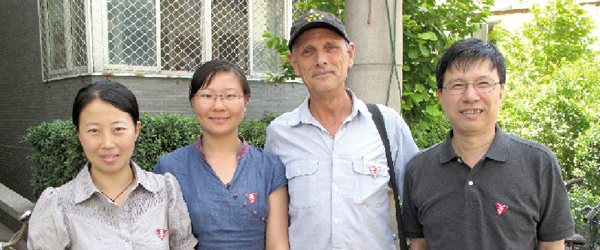 |
Large Medium Small |

Michael Crook’s link with the Gung Ho movement is through his mother, Isabel, and his late father, David.
The daughter of a Canadian missionary, Isabel was born in Chengdu, Sichuan province, in 1915. She returned to Canada to complete her education and came back to China in the late 1930s.
While doing anthropological and sociological research in China, Isabel met David, a member of the British Communist Party who volunteered to fight with the anti-fascist International Brigades during the Spanish Civil War (1936-39).
Inspired by the book Red Star Over China by the American writer Edgar Snow, David traveled to Shanghai in the late 1930s. In fact, both Isabel and David had met Rewi Alley previously in China. Alley was the New Zealander who helped to initiate the Gung Ho movement to bolster China’s resistance against Japanese invaders. The couple joined the movement and actively promoted cooperatives throughout China.
Michael, the couple’s second son, did not join the Gung Ho movement until the late 1980s. The movement is known as the International Committee for the Promotion of Chinese Industrial Cooperatives (ICCIC) and the phrase Gung Ho is derived from gong ye he zuo, roughly meaning an industrial cooperative.
Born in Beijing in 1951, Michael grew up in a hutong. His mother tongue is Mandarin Chinese. And while he has a Western face, he inherited his parents’ love and passion for China, said Michael Crook. At age 8 he moved to England and eventually completed his college studies at Queen Mary University, London.
After teaching in the United States for a few years in the 1980s, he decided to return to Beijing in 1988 to help his mother with her Gung Ho activities. He worked first as a volunteer, polishing the organization’s newsletter, before becoming a member. He was elected vice-chairman of the ICCIC 15 years ago after working with the Canadian International Development Agency.
The fact that China has embraced the stock market and private enterprise increases his resolve to promote cooperatives. In fact, he helped revive the ICCIC when the state started selling off industrial assets in 1987.
He sees the cooperative sector as performing a vital role as a middle ground between State-owned enterprise and the private sector, especially with farms and other rural enterprises. Now the ICCIC is promoting and developing cooperatives in China through training and consulting.
“I was involved in development work and I liked it,” said Crook. “Besides teaching, development is also my field.”
Apart from his work with the ICCIC, Crook teaches at the Western Academy of Beijing, an international school. “Teacher is always the title I like,” he said.
He happily concedes to possessing two personas: the first being an upper-middle-class Englishman when he speaks English, and the second a more vulgar local when he discourses in Beijing-accented Mandarin.
Crook’s brother Carl, 60, works as a wine importer in Beijing. Another brother, Paul, 56, works for the British Broadcasting Corp World Service in London. Their father died in 2000 and their mother, 94, remains in good health. She spends the summer months in the UK but otherwise lives in Beijing.